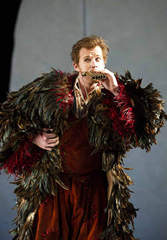| Opera Reviews | 23 April 2024 |
A stimulating production even after 25 yearsby Colin Anderson |
|
| Mozart: The Magic Flute English National Opera 13 September 2012 |
|
|
It seems though that having been reprieved twice from retirement, such stagecraft is now finally being put out to pasture. This seems a shame for the direction has a timeless quality - the sets billow colourfully or suggest grand learning - and tells the story lucidly in fun and informative terms without suggesting the circus or being too lofty. A new ENO production is mooted: whoever is directing has a tough act to follow. For this fourteenth revival, musically things are mostly impressive. Nicholas Collon conducts. He sculpts an expressive if lightweight overture, which on this first night was just a little over-bright in sound and a little fidgety in ensemble; good to have it played with the curtain down and therefore without potentially irritating and distracting stage-business. The playing settled though, the woodwinds being especially beguiling, Collon chooses apt tempos and is affectionate in his phrasing while displaying a good ear for contrasting dynamics. But there should be greater depth to this music at times: the opening to Act II, March of the Priests, needed to be statelier and more eloquent (it's difficult to forget the degree of pathos Colin Davis can extract from this miniature). And there were moments when a fuller sound was craved for; that said there was an attractive deftness and lightness to the playing and the in-pit flute, echoing Tamino's action, was magic indeed. A good level of energy sustained this involving performance and gave a good sense of moving forward; so too the lively dialogue in an excellent translation by Jeremy Sams. Comedy and surrealism attractively berthed alongside each other as we were eased into a world apart. Shawn Mathey brought a rich tenor and shapely phrasing that was appropriate to the aristocratic and goodly Tamino, to which Elena Xanthoudakis's Pamina was winningly seductive. Kathryn Lewek was too-friendly a Queen of Night, but her arias found her poised if maybe too controlled to conjure a fearsome royal; Adrian Thompson was an oleaginous and evil Monostatos. The three Ladies enjoyed banter and competition, and the three Boys were truly excellent. Four rather than 'the three' bears (actors) could only win the audience over further, building on the aah-factor which the doves (real and on cue) had already established. If Act II is less successful, this is as much to do with the lengths imposed by Schikaneder and Mozart, a bit of a trial, although the Trials themselves are imposingly staged here. The weak point is the Papagena of Rhian Lois, if not vocally, for this tea-lady with a Welsh accent (I think) really doesn't pass muster. Duncan Rock as Papageno had a mixed evening; he took a while to unfold his vocal armoury but remained somewhat uneven across his range; he was though a bumptious 'cheeky chappie', enough to want to slap him - maybe that's the point - and he dealt brilliantly with a good-natured intrusion from a lady in the audience answering a lovelorn plea of his. Ah, Robert Lloyd, a wonderfully generous and compassionate Sarastro. The odd doubt aside, this is a stimulating production and is inhabited by an overall excellent cast. At the end the sun rises and the ENO Chorus offered a glowing envoi. |
|
| Text ©
Colin Anderson Photo © Alastair Muir |

 English
National Opera opens its 2012-13 season with ten performances of a favourite
production. Nicholas Hytner's staging of The Magic Flute is 25
years old and is as fresh and endearing as ever, here revived by Ian
Rutherford and James Bonas.
English
National Opera opens its 2012-13 season with ten performances of a favourite
production. Nicholas Hytner's staging of The Magic Flute is 25
years old and is as fresh and endearing as ever, here revived by Ian
Rutherford and James Bonas. 




